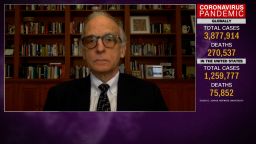Editor’s Note: Watch the full conversation with SE Cupp and her panel of experts on “What Comes Next?” here. Kent Sepkowitz is a CNN medical analyst and a physician and infection control expert at Memorial Sloan Kettering Cancer Center in New York. The views expressed in this commentary are his own. View more opinion at CNN.
Polls show more and more Americans are saying they will get the Covid-19 vaccine when it’s their turn. That’s good news. But skepticism, conspiracy theories and misinformation are still rampant, making it unclear just how much longer we’ll be living amidst a viral pandemic and all that comes with it. This week, I talk to Dr. Kent Sepkowitz, a physician at Memorial Sloan Kettering, and Tom Nichols, author of “Our Own Worst Enemy,” to find out what comes next for America and the vaccine. But first, Sepkowitz writes our CNN op-ed. - SE Cupp
Last month, the US introduced a pair of new vaccines that were developed using a novel scientific technique to stop the spread of a deadly virus. The goal is to vaccinate as many people as are willing, as soon as possible. This is all while the nation is changing presidents and trying to save a reeling economy.

In other words, we are in the midst of rolling out a completely unprecedented national program with no promise that things will work out as intended.
The first weeks of the vaccine rollout have drawn intense criticism from politicians, including President-elect Joe Biden, scientists and countless others who seem to have expected smoothly choreographed execution from production labs, transport truckers, supply chain workers and hundreds of clinics and millions of recipients.
Their unrealistic expectation makes some sense. After all, scientists had just pulled a once-in-a-century sort of rabbit from their hat, producing a seemingly first-rate pair of vaccines in record time with, up to now, very little evidence of concerning side effects. After doing the impossible once, many assumed that a second longshot would hit the mark as well and a flawless vaccine implementation program would magically appear.
Wishful thinking. Instead, we have a plodding, mediocre program in place despite the neglect of the Trump administration, which has extended its “take no responsibility” attitude to include a refusal to develop any semblance of a coordinated federal vaccine effort.
Which brings us to January 20 and the incoming Biden administration, full of plans and programs. Though this is assuring for many, they should expect strong political disagreement on many issues as officials try to vaccinate at warp speed.
First, Biden has made clear that he believes in deliberate active governing rather than vague Darwinian market forces to optimize public programs. He already a Covid-19 response team led by capable experienced people whose job will be to organize and make decisions and do the many boring behind-the-scenes tasks of government. These are people at desks, on the phone, in meetings – people with unmemorable faces and no political axes to grind.
Here come the bureaucrats. Lots of them. They will build an ambitious but imperfect plan and become easy fodder for the (re-invigorated) Republican song of small government.
Next, Biden et al. are believers in science, in the exact process – fund the scientists and get out of their way – that led to 2020’s great vaccine miracle. But don’t think that will help them win hearts and minds. Not everyone believes in the vaccine or even the virus itself.
As the Covid-19 vaccine story has evolved, medical historians have recalled the polio vaccine campaign of 1955 that led to elimination of the disease in the US decades later. It is important to remember that, in the decades it took to produce the Salk and then Sabin vaccines, many children were killed or crippled along the way.
Despite the missteps, the polio vaccine program was embraced by most of the public, perhaps owing to the poignancy of a disease that could permanently harm children as well as a greater trust in both science and government in the decade after World War II concluded.
In contrast, the public attitude towards Covid-19 and the vaccine splits across political lines. Even the brutal fact that it has killed more than 1.8 million people globally, including 350,000 in the US, has failed to sway some. We continue to have inconsistent acceptance of basic public health measures, as if the recommendations were an assault on free choice, a capitulation to a bunch of whimpering scientists with their fake news graphs and charts.
Finally, the poorly understood concept of herd immunity is likely to cause serious dispute among citizens, given that it focuses on the well-being of the community and not the individual. The idea of herd immunity was developed a century ago by veterinary researchers interested in livestock. They and others created a statistical model to estimate how many people (or animals) in a community must be immune (by vaccine or natural infection) to make it very unlikely for a non-immune person to become infected.
Viewed a different way, the premise of herd immunity (better referred to, in my opinion, as “community immunity”) is this: we want to vaccinate you to help you, sure, but mostly to protect that guy over there whom you have never met and with whom you might disagree about everything, who has decided not to get the vaccine. If we all pull together as a group, it makes life better for everyone!
This message of communitarianism is at odds with much of the current political discourse. And the e pluribus unum angle is likely to sharpen as we learn just how many people will decline the vaccine. As of early December, just over a quarter of the population were hesitant to take the vaccine, according the Kaiser Family Foundation. This group represents veteran anti-vaxxers, some additional Trump stalwarts determined to stare the infection down, others who already had the infection and think enough is enough, and of course some who believe the baseless conspiracy theory that Bill Gates wants to place a microchip into their bodies.
No matter how they arrived at their refusenik stance, if this group is large enough, it may prevent herd immunity, which experts estimate would require immunity from 70-85% of the population to achieve. That would precipitate discussions of mandatory vaccination, which, in turn, would inflame those already determined to avoid vaccination, threatening the entire national campaign and exacerbating a giant national argument about the role of government in daily health and safety.
Get our free weekly newsletter
Personally, I doubt it will hit a boiling point – if indeed more than half of the country is vaccinated and many additional people already are immune, at least for a while, from natural infection, we likely will see good, though not great, control of the Covid-19 pandemic.
This would mean that, rather than a runaway pandemic, we would see occasional small and moderate-sized outbreaks here and there, similar to what we see with measles, whooping cough and other vaccine-preventable infections almost every year. It’s terrible and tragic and unnecessary – but it’s not on the same scale as the current historic pandemic.
Indeed, it is likely that by this time next year, we will be back to fighting tooth and nail about tax cuts and Middle East policy and reproductive rights. Which I suppose is some version of good news.






